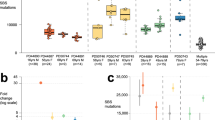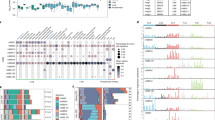Abstract
Damage arising from putative environmental sources has been found in the DNA of the gastric and colorectal mucosae of patients presenting with gastrointestinal disorders from the South Manchester area. O6-Methylguanine (O6-MeG) in the range 0.010- greater than 0.300 mu moles mole-1 adenine was heterogeneously distributed both between and within individuals. The pattern of alkylation of tissue DNA appears to differ when comparison is made between gastric and colorectal samples. Most of the gastric tumour DNA samples were alkylated (5/6; 0.087 +/- 0.097), whereas the DNA of the associated mucosa was alkylated less frequently (2/7) and to a lesser extent; (0.017 +/- 0.030; P = 0.07). Conversely, colorectal tumour DNA was alkylated infrequently (1/7) and to a lower extent (0.003 +/- 0.007) than the DNA of the adjacent mucosa (8/10 samples alkylated with a mean of 0.083 +/- 0.106; P = less than 0.01), or indeed of any other tissue. Although increased levels of DNA damage in tissue associated with malignant disease have been indicated by independent studies of DNA damage at other cancer sites, significant differences were not observed in the present report, neither was there any suggestion of a relationship with smoking or alcohol consumption. The data provided by this report indicate that exposure to putative environmental alkylating agents occurs in the UK at levels comparable to those previously detected in areas of higher cancer risk. Although we cannot determine the extent to which this DNA damage is attributable to normal background exposures, it is evident that the alkylation of tissue DNA occurs and is not uniform. In conjunction with other reports, therefore these differences may begin to provide indications of mechanisms that could be of relevance in the aetiology of gastrointestinal cancers.
This is a preview of subscription content, access via your institution
Access options
Subscribe to this journal
Receive 24 print issues and online access
$259.00 per year
only $10.79 per issue
Buy this article
- Purchase on Springer Link
- Instant access to full article PDF
Prices may be subject to local taxes which are calculated during checkout
Similar content being viewed by others
Author information
Authors and Affiliations
Rights and permissions
About this article
Cite this article
Hall, C., Badawi, A., O'Connor, P. et al. The detection of alkylation damage in the DNA of human gastrointestinal tissues. Br J Cancer 64, 59–63 (1991). https://doi.org/10.1038/bjc.1991.239
Issue Date:
DOI: https://doi.org/10.1038/bjc.1991.239
This article is cited by
-
Meat consumption and K-ras mutations in sporadic colon and rectal cancer in The Netherlands Cohort Study
British Journal of Cancer (2005)



